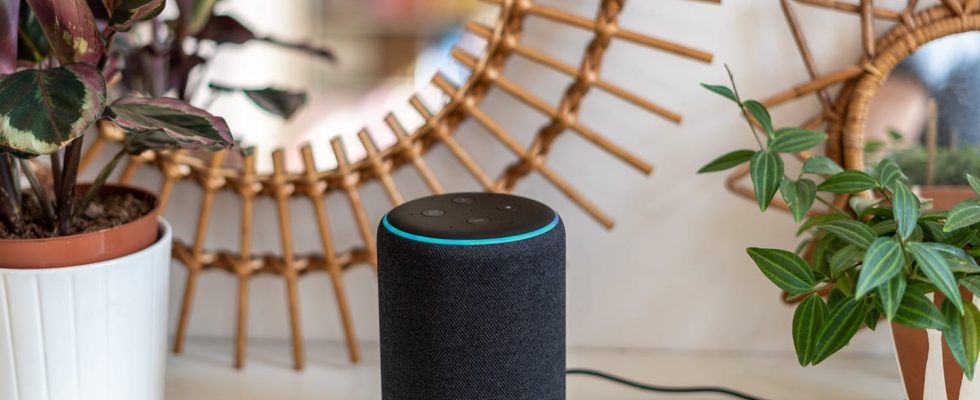While Google and Microsoft are waging a fierce war to dominate the artificial intelligence sector, Amazon is working to improve Alexa, its intelligent assistant, using its own language models.
The release of the conversational artificial intelligence ChatGPT in November 2022 created excitement on the Internet, but also within the digital and technology sectors. The merciless war between Microsoft and Google has already spread to other companies, Opera and Baidu – the “Chinese Google” – having already started hostilities – not to mention services like Adobe and Canva. Even Elon Musk, after loudly proclaiming his concern about this technology, ended up getting started (see our article)! Consequently, some feared that Amazon was falling behind in this area. Since then, the e-commerce giant has started to gradually deploy Bedrock, a set of generative AIs supposed to allow companies and professionals to develop services and tools at a lower cost (see our article). But he does not intend to stop there and expects to bet on Alexa to compete with other generative artificial intelligences, as revealed Business Insider. Enough to boost the popularity of the voice assistant, while 100 million of its connected speakers have adopted the Matter and Thread protocolstwo new standards in home automation.
Amazon: an Alexa soon to be boosted with generative AI
In an interview given to Financial Times andn February 2023, Andy Jassy, the CEO of Amazon, assured that he was not worried about this and was even rather confident. “I think it’s exciting what is possible with generative AI”he declares before adding that “most large, deeply technical companies, like ours, have been working on these very large generative AI models for a long time”, without giving further details. The company plans to work more with other, smaller companies in the field of artificial intelligence, as is already the case with Stability AI, a competitor of Open AI.
It must be said that Amazon has already had artificial intelligence and machine learning technologies for several years, such as its voice assistant Alexa and CodeWhisperer, an AI-based code assistant. Alexa is present in many homes through devices that integrate its functions such as Echo speakers. Some users use it for practical tasks, such as playing music, setting lights and alarms, or managing energy consumption, but others like to use the assistant for more entertaining purposes, such as asking it share jokes or tell stories.
But as wonderful as she is, Alexa can’t compose poems or write codes herself, unlike ChatGPT – although the result isn’t always right. So she’s behind on that. Amazon is currently working on making it more “conversational”, given that it only answers user questions. “We are as committed as ever to Echo and Alexa and will continue to invest heavily in them,” explained in November 2022 David Limp, the vice-president of Amazon, to Business Insider. However, the voice assistant has a big advantage over ChatGPT: its ability to offer personalized services.
Amazon Alexa: a more personalized AI?
Indeed, it remembers things like the user’s favorite music, his favorite type of book or even the news likely to interest him the most. He can also remember important deadlines and is perfectly comfortable with real-time information. Assets which, coupled with a generative AI, could produce the most interesting results. According to internal documents seen by Business Insider, Amazon has been working on its own language models for several years. Among them, LLM (Large Language Model) Alexa Teacher Model, already partly exploited, but also “new models that are much larger, more generalized and more efficient” aiming to make Alexa “more proactive and conversational“, according to a spokesperson.
At the moment, Amazon is focusing on Alexa LLM Entertainment Use Cases, i.e. entertainment-related functions. Among the different possible uses, the company mentions that Alexa would be able to invent a story to tell it to a child. Thanks to the camera integrated into certain Echo speakers, such as the Echo Show, the voice assistant would adapt the story according to the environment, to include the stuffed animal that the young user is holding in their hands, for example. He could also, via his screen, project illustrations that the AI will have generated especially for the story. Alexa could also identify a series from piecemeal information provided by the interlocutor, or at least make relevant recommendations, and offer the user to subscribe to the streaming platform broadcasting the program. Moreover, Amazon is already planning strategic partnerships with certain companies such as Disney, Lego and HBO, which would help increase the revenue generated by Alexa.
The voice assistant would also be able to make it easier to find and read news, presenting a personalized summary of important facts and helping users dig deeper into topics by retrieving related news and information. In its internal note, Amazon believes that the user should have the impression “that Alexa thinks rather than retrieves information from a database”.
Hopefully, however, the company won’t rush things, because this kind of artificial intelligence is as revolutionary as it is destructive. Indeed, AIs have a tendency to “hallucinate”, that is to say invent and affirm false information with aplomb. Bard, that of Google, had also made a mistake during his first presentation, which had caused the company to lose no less than 100 billion dollars on the stock market (see our article). This can have disastrous consequences, especially with the everyday actions that voice assistants perform.
